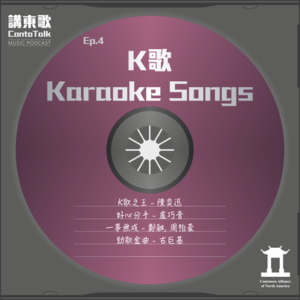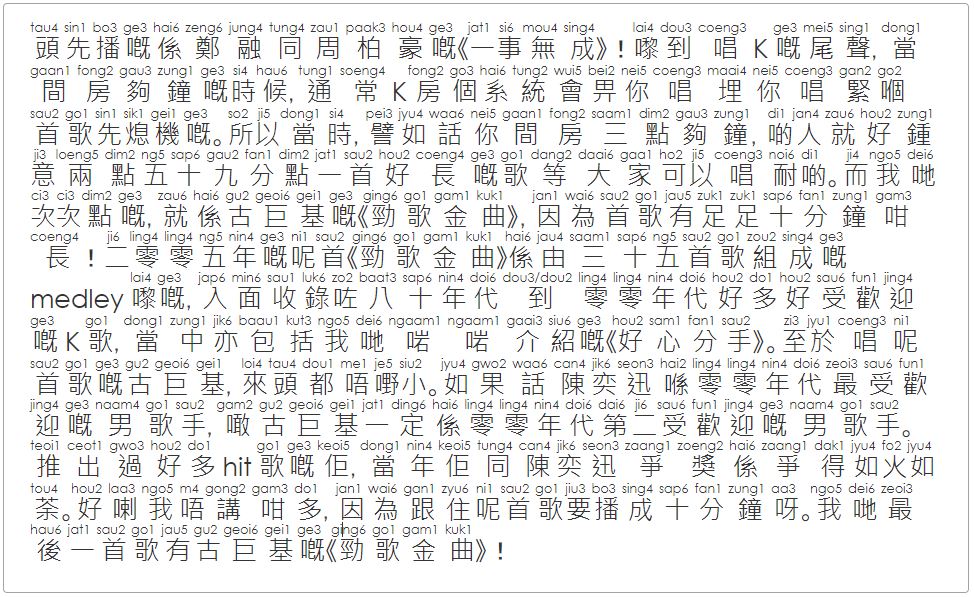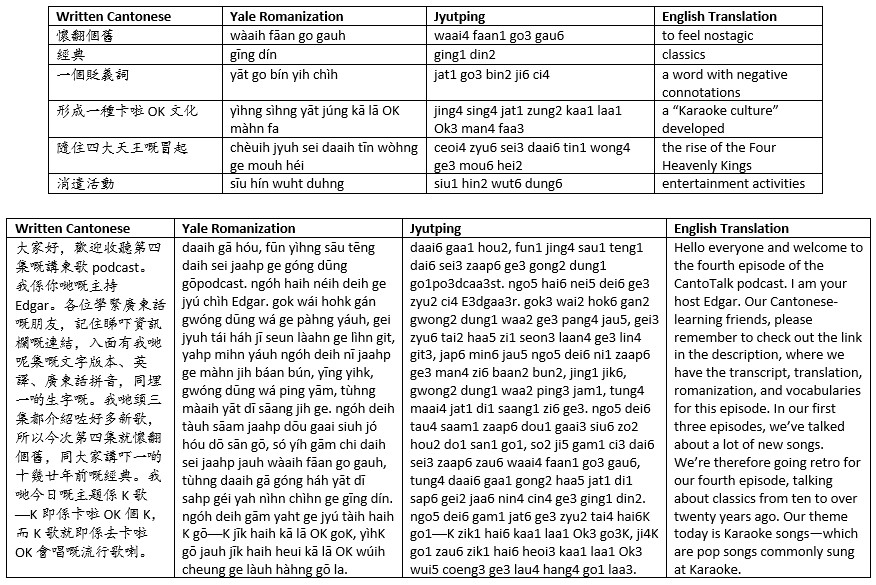CantoTalk Episode #4



However, illegal copies and downloads rose in the late 90’s, drastically decreasing revenues from CD sales. Thus, labels would seek commercial opportunities from Karaoke copyright fees. Furthermore, songs could only be distributed through big labels, TV stations, and radios, since listening to songs through streaming or the Internet was not as popular back then. All of these led to the market heavily leaning towards producing Karaoke songs that would be popular in Karaoke, meaning songs that have a slow melody, no notes that are too high or too low, easy-to-remember lyrics, and that most of them are about love, such that people can let out their emotions through singing. In the end, this rote genre dominated the music scene for over ten years, making Hong Kong’s pop music extremely boring, even to the point where listening to Cantopop was considered “old-fashioned”. This phenomenon did not improve until recent years. That said, many classic, good Cantopop songs in the 00’s belong to this Karaoke song genre. And I, your host, have really liked going to Karaoke since my secondary-school years. At my craziest peak, I once sang Karaoke three times a day with three groups of friends after an exam. Thus, the songs we’re talking about today are Karaoke songs from the 00’s that I’ve seen chosen the most in Karaoke rooms, paying homage to this Karaoke culture.

Our first song is King of Karaoke by Eason Chan. When we talked about Eason Chan in our first episode, we dubbed him “the most famous male singer in Hong Kong”. King of Karaoke, in turn, is one of Eason Chan’s most popular songs. It’s actually very fitting to have this song, released in 2000, be first, as both its melody and lyrics serve as responses to the popular Karaoke songs of that time. For example, the intro of King of Karaoke is exactly the intro of 約定 (lit. Promise) by Faye Wong. Furthermore, the lyrics of King of Karaoke are all names of different songs. For example, in “if you’ve never heard, that an oath is just like a happy ferris wheel”, 誓言 (lit. Oath) is a song by Faye Wong, and Happy Ferris Wheel is another song by Eason Chan; in “Who is trash? Who misses me being sad, sharing itchome with me?”, 垃圾 (lit. Trash) is a song by Candy Lo, and Farewell Cho Me is a song by Mariam Yeung. Lyricist Albert Leung is very talented: under the constraint of having all the lyrics be names of songs, he still managed to build a story out of them. The lyrics of the song talked about a boy wanting to confess his feelings through songs and his love through Karaoke. However, the girl didn’t really care and notice, perfunctorily saying that the boy is “the King of Karaoke”. So the song is actually a sad story about the failure to confess love. Okay, for our first song, we have Eason Chan’s King of Karaoke!

The song just now was Eason Chan’s King of Karaoke! Since we just had a song by a male singer, it’s now of course the time for a song by a female singer. For the most famous Karaoke song in that era by a female singer, it could only have been 好心分手 (lit. Please Break Up) by Candy Lo. Candy Lo was originally an underground band singer with a lot of character in her music. In 1998, she debuted as an independent artist. Besides releasing songs full of her style, her label also arranged the release of her more commercial and pop Karaoke songs. One of such songs is 好心分手 in 2002, a song about breaking up. Perhaps since many ladies who had just broken up found solace in the song, the song became very popular back then, with everyone knowing how to sing it. The song got over twenty awards in Hong Kong, Mainland China, the U.S., Canada, Singapore, and Malaysia, and is still one of the most chosen songs in Karaoke today. Though this song brought Candy Lo to the peak of her career, it also caused her to have mood disorders, since she’s not used to having so many paparazzis and spotlights following her. Grudgingly, she gradually faded out from the music scene. Luckily, she’s been much better lately. In the past several years, she’s been releasing new songs again, and was even casted in TV shows. Everyone’s very happy for her. Without further ado, our second song features a love song that’s been conquering the Karaoke scene: 好心分手 by Candy Lo!

The song just now was 好心分手 by Candy Lo! Since we just had a song by a male singer and a song by a female singer, the next song, of course, would be a male-female Karaoke duet! Back in my days, whenever I went Karaoke with girls, someone would always choose Nothing Done by Stephanie Cheng and Pakho Chau. If we’re talking about the Karaoke songs in the 00’s and 10’s, we mustn’t leave out Pakho Chau’s name. Originally a model, Pakho Chau has a narrow vocal range and has often been criticized for his singing skills. His label, though, knew that he belongs on the path of an idol, giving him many Karaoke songs and love songs to sing. A lot of his songs are easy to sing, have memorable lyrics, and catchy melodies, making many know his songs and ultimately rose him to popularity. Debuted several years earlier than Pakho Chau, Stephanie Cheng also sprung out at the beginning by singing Karaoke songs and love songs. Many of her earlier songs are about girls’ feelings. For example, her 紅綠燈 (lit. Traffic Light) is another one of 00’s classic Karaoke songs. In 2008, she released Nothing Done with Pakho Chau. Besides being Pakho first number one song on the radio charts, Nothing Done also became a classic duet Karaoke song for the MK culture of that time. MK stands for Mong Kok. In the 00’s and 10’s, people often used the word MK to describe trendy teenageers with over-the-top outfits and hairstyles, and especially like using foul language. The song talks about a man and a woman with an unsuccessful business career, so they hope they could find success in love instead. Last year, Stephanie Cheng and Pakho Chau performed the song at TVB’s Community Chest Charity Show, showing support to families who have lost their jobs. This is essentially cursing people to continue failing at their careers! Of course, they’re ridiculed and laughed at by people on the Internet. Okay! For our third song, we have Nothing Done by Stephanie Cheng and Pakho Chau!

The song just now was Stephanie Cheng and Pakho Chau’s Nothing Done! At the end of a Karaoke session, when the time of the room’s almost up, the Karaoke system would usually let you finish the song you’re singing before turning off. Thus, say your room’s time’s up at 3:00, at 2:59, people would choose a longer song so they could sing for a while longer. The song we’d always choose in this case, is The Big Hits by Leo Ku, since it’s over ten minutes long! Released in 2005, The Big Hits is a medley composed of 35 songs, featuring many popular Karaoke songs from the 80’s to 00’s, including 好心分手 that we talked about just now. The singer of the song, Leo Ku, is no small fly either. If Eason Chan’s the most popular male singer in the 00’s, then Leo Ku must be the second most popular male singer in the 00’s. With many popular hits under his belt, he and Eason Chan competed furiously for awards back in the days. Okay I better stop talking, as the next song’s over ten minutes. For our last song, we have The Big Hits by Leo Ku!

To the right is a screenshot preview of a comprehensive handout that includes a full transcript, vocabulary, comprehension questions, and a featured song. The handout will be available for purchase, with the added benefit that CantoLTA members can enjoy up to 2 complimentary handouts and can purchase additional ones at an exclusive 20%


Thank you for tuning in!
Please give credit to Edgar Chung and the Cantonese Alliance of North America!

 Please go to Quizlet for 32 vocabulary items:
Please go to Quizlet for 32 vocabulary items: